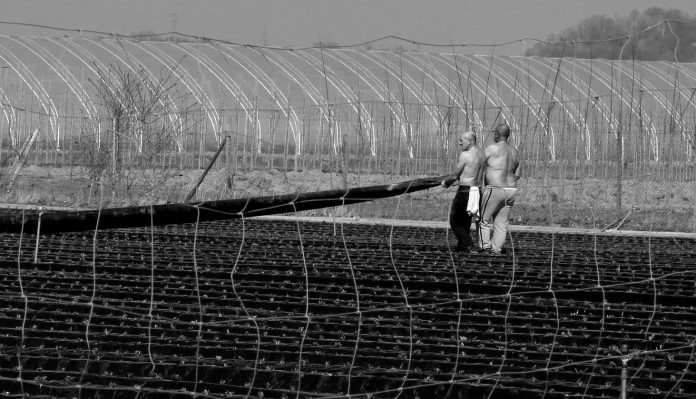In this season of agricultural harvests and everywhere in Europe, from Italy to Austria, via Germany and France, hundreds of thousands of workers coming mostly from Eastern Europe, are missing in farms. This difficulty in recruiting seasonal workers, essential for this sector, casts a harsh light on the lack of appreciation of agricultural professions and the ensuing system of institutionalized exploitation. In this sector reigns supreme the pure logic of profit, ever-decreasing purchase prices – especially of large discounters – of goods often made by hand, which ineluctably leads to dumping wages.
Large western European farms are indeed largely functioning on precarious employment of a non-local workforce, which is poorly paid, sometimes undeclared and made up of mobile workers or even very often posted workers. The European Commissioner for Agriculture, Janusz Wojciechowski, was well aware of that when he asked a few days ago to make it easier for them to cross borders, on the grounds that these workers would be essential for EU food security.
His call was heard, and it is now by whole buses and charter flights that they flock to harvest asparagus in Germany or tomatoes in Italy. While the health situation seems to have been under control in Romania so far, the opening of an “air bridge” decided by Bucharest under pressure from the German employers and government runs the risk of deterioration.
Large western European farms are indeed largely functioning on precarious employment of a non-local workforce, which is poorly paid, sometimes undeclared and made up of mobile workers or even very often posted workers
We are concerned about the fate of these workers. No one can believe that social distancing measures will be correctly observed, in a sector operating on the basis of shared tools, public transport and accommodation in dormitories. When these workers get sick or injured on the job, Western European healthcare systems will not be able to take care of them, due to their status. Even if they had stayed at home, they would not have been eligible for short-time work schemes, having very often not contributed to any social security system due to fraudulent practices.
In this regard, it should be recalled that in the context of mobile work (posted or seasonal workers, both statuses being often amalgamated), fraud is massive in Europe. Thousands of posted workers are therefore not covered by any health insurance, which makes them even more vulnerable during a pandemic. It is not uncommon for workers who have had to be hospitalized in emergencies to leave with bills of several thousand euros, due to the lack of medical insurance.
The crisis exacerbates the intrinsic inequity of posted work, a system exploiting hundreds of thousands of workers across Europe, playing on the competition of social systems and the gap between wages, for the sole benefit of big business. The Covid 19 crisis invites us to rethink everything. The new world has to start now and it starts with equal rights!
Manuel BOMPARD, Member of the European Parliament, France Insoumise (France)
Leila CHAIBI, Member of the European Parliament, France Insoumise (France)
Özlem DEMIREL, Member of the European Parliament, Die Linke (Germany)
Marc BOTENGA, Member of the European Parliament, PTB (Belgium)
Malin BJÖRK, Member of the European Parliament, Vänsterpartiet (Sweden)
Nikolaj VILLUMSEN, Member of the European Parliament, Enhedslisten (Danemark)

